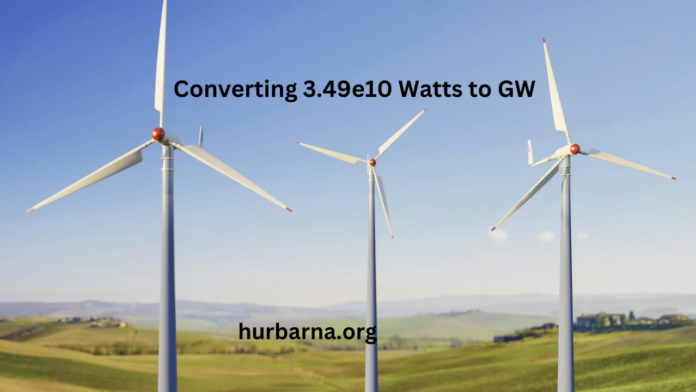When it comes to understanding and comparing different units of power, conversion is a crucial skill. 3.49e10 watts to GW is a common conversion request, especially in fields like engineering, energy production, and scientific research. In this blog, we’ll break down the process of converting 3.49e10 watts to GW (GW), explain the importance of such conversions, and explore practical applications.
Understanding Power Units
Before diving into the conversion, it’s essential to understand the units involved:
1. Watt (W)
The watt is the standard unit of power in the International System of Units (SI). It represents the rate at which energy is used or produced. One watt is equivalent to one joule per second. This unit is commonly used in various contexts, from electrical appliances to large-scale power generation.
2. Gigawatt (GW)
A gigawatt is a larger unit of power, equal to one billion watts (1 GW = 1,000,000,000 W). It is typically used to measure the output of power plants or the total energy consumption of large cities or industrial processes.
Conversion Formula
To convert 3.49e10 watts to gw, you use the following formula:
Power (GW)=Power (W)1,000,000,000\text{Power (GW)} = \frac{\text{Power (W)}}{1,000,000,000}
This formula simplifies the process of converting from a large unit (watts) to a much larger unit (gigawatts).
Converting 3.49e10 Watts to GW
Let’s apply the formula to convert 3.49e10 watts to GW.
- Start with the given value: 3.49e10 watts
- Divide by one billion:
Power (GW)=3.49×10101,000,000,000\text{Power (GW)} = \frac{3.49 \times 10^{10}}{1,000,000,000}
- Perform the calculation:
Power (GW)=34.9 GW\text{Power (GW)} = 34.9 \text{ GW}
So, 3.49e10 watts is equivalent to 34.9 gigawatts.
Importance of Power Conversions
Understanding how to convert between different units of power is vital for several reasons:
1. Energy Production and Management
In the energy sector, gigawatts are a common unit for describing the capacity of power plants and grids. For instance, a large power station might have a capacity of several gigawatts. Converting watts to gigawatts helps in comparing and analyzing the scale of different power sources.
2. Engineering and Design
Engineers and designers often work with various units of power when designing electrical systems, machinery, or infrastructure. Being able to convert between watts and gigawatts ensures accurate calculations and efficient designs.
3. Scientific Research
Researchers studying energy systems, climate change, or other scientific areas may need to convert power units for their analyses. Accurate conversions are essential for making valid comparisons and interpreting results correctly.
4. Public Awareness and Communication
For the general public, understanding these conversions helps in comprehending reports and discussions about energy consumption, power generation, and environmental impacts. It enables people to grasp the scale of power usage and its implications.
Practical Applications
1. Power Plant Capacities
Large-scale power plants, such as those running on nuclear or renewable energy, are often measured in gigawatts. For example, a nuclear power plant with a capacity of 34.9 gigawatts would be a major facility contributing significantly to the energy grid.
2. Energy Grid Management
National and regional energy grids are managed and operated based on their total capacity and current demand, measured in gigawatts. Converting between watts and gigawatts helps in planning and ensuring that the supply meets the demand efficiently.
3. Environmental Impact Assessments
When assessing the environmental impact of power generation, understanding the scale of energy production in gigawatts can help in evaluating its effects on emissions, resource usage, and sustainability.
Conclusion
Converting 3.49e10 watts to GW is a straightforward process that involves dividing the wattage by one billion to get the equivalent power in gigawatts. In this case, 3.49e10 watts is equal to 34.9 gigawatts. This conversion is essential for various applications, from energy production and engineering to scientific research and public communication.
Understanding and performing power unit conversions ensures that you can accurately interpret and manage energy-related data, whether you’re working in the energy sector, studying environmental impacts, or simply trying to grasp the scale of power systems. With this knowledge, you can better navigate the complex world of energy and power management.
For further information on power units, conversions, and their applications, consider exploring educational resources or consulting with professionals in the field. By mastering these conversions, you’ll enhance your ability to analyze and understand the vast and impactful world of energy.
